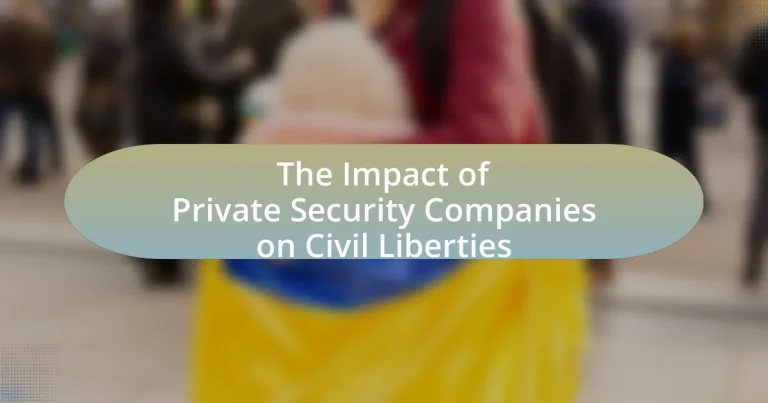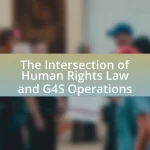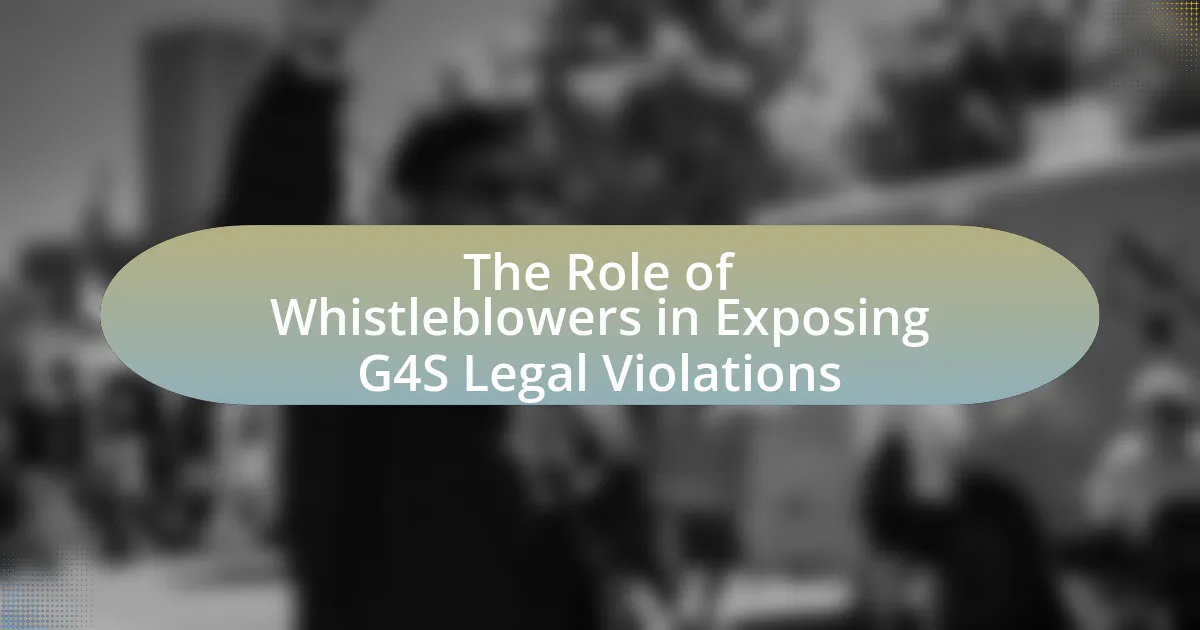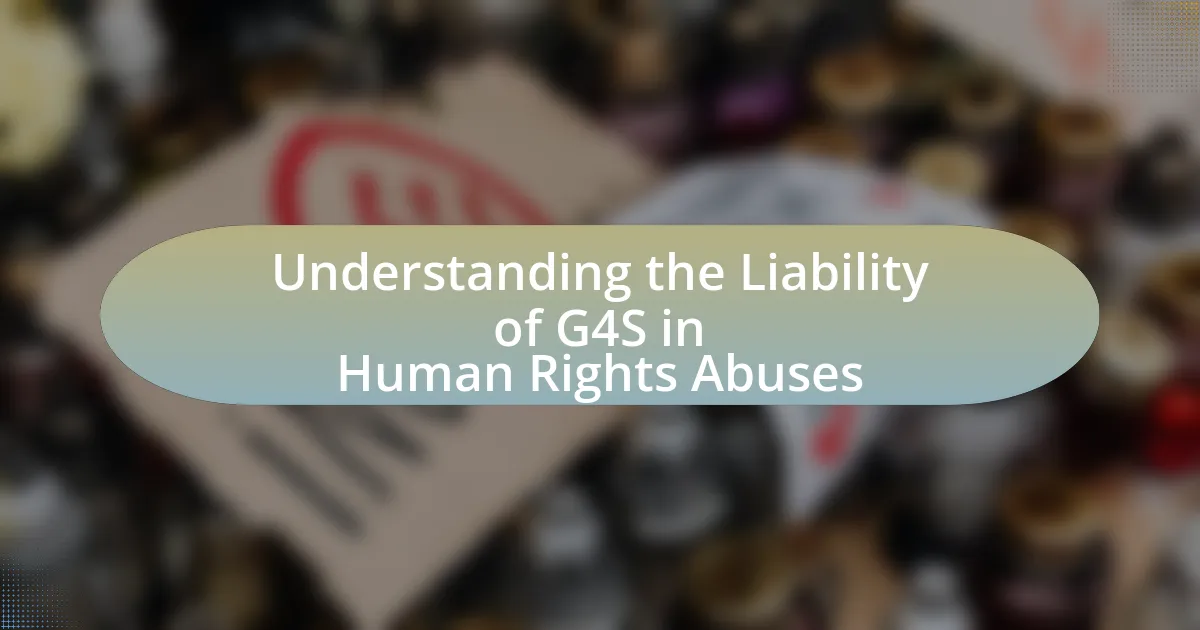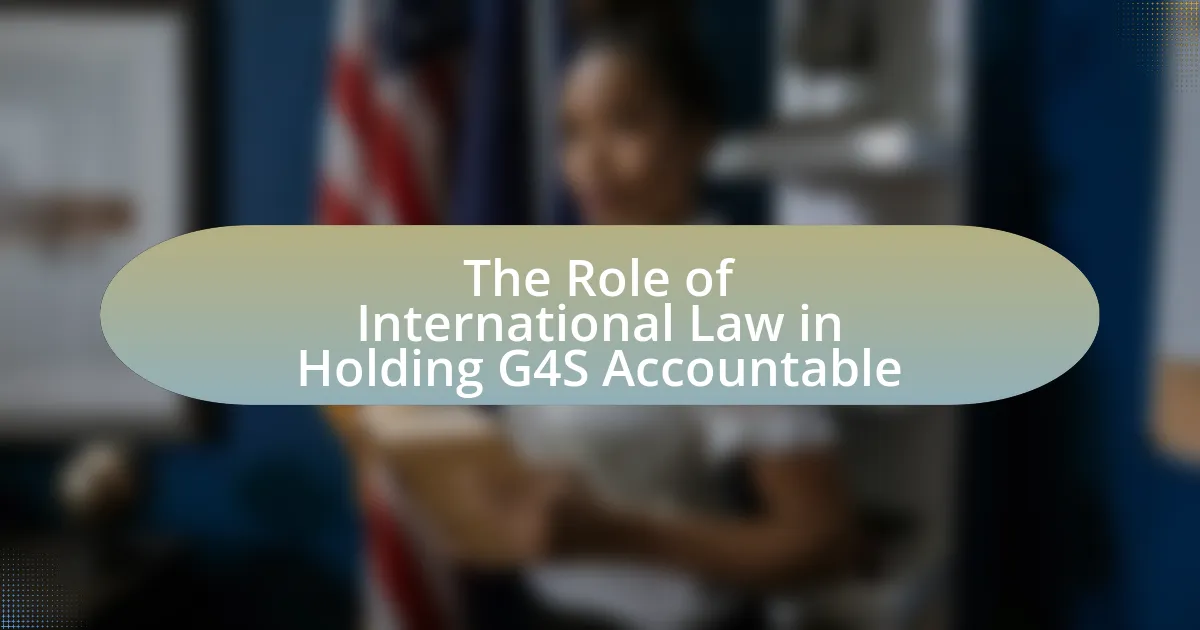Private security companies (PSCs) play a significant role in society by providing security services to individuals, businesses, and government entities, often filling gaps left by public law enforcement. This article examines the operations, services, and historical context of PSCs, highlighting their impact on civil liberties, including privacy rights and freedom of assembly. It discusses the legal frameworks governing PSCs, the controversies surrounding their accountability, and the ethical concerns related to their practices. Additionally, the article explores the implications of privatizing security services and offers recommendations for ensuring the protection of civil liberties in the presence of private security.
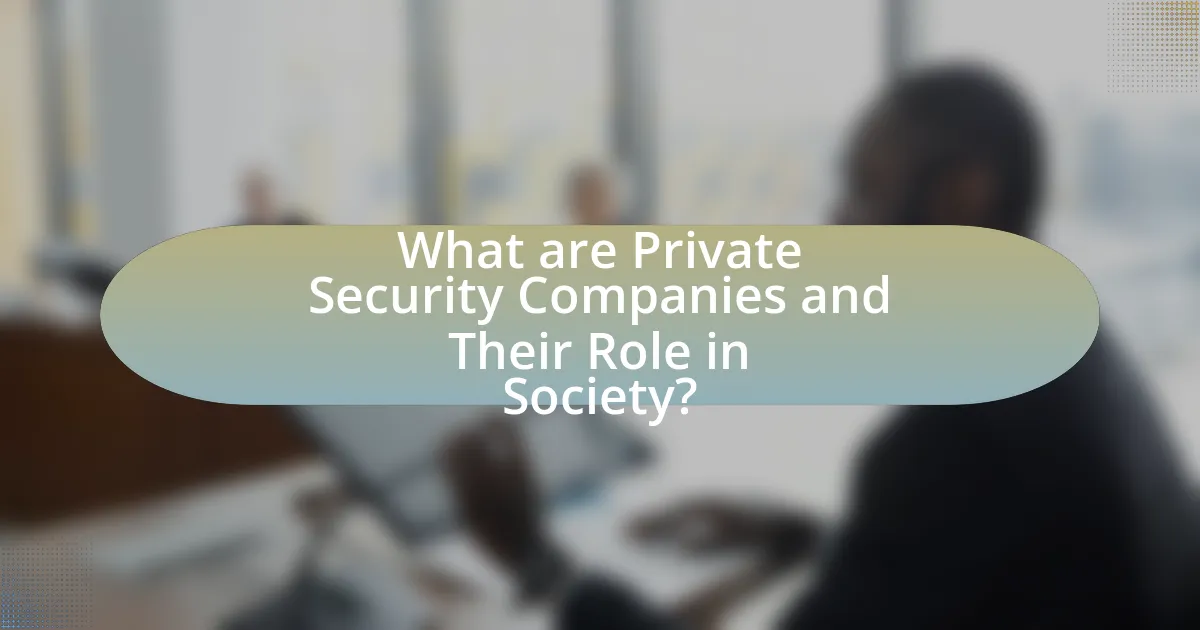
What are Private Security Companies and Their Role in Society?
Private security companies are organizations that provide security services to individuals, businesses, and government entities, often supplementing or replacing public law enforcement. Their role in society includes protecting property, ensuring safety at events, and managing risks, which has become increasingly important in urban areas where crime rates may be higher. According to the Bureau of Labor Statistics, the private security industry employed over 1 million security guards in the United States as of 2020, highlighting its significant presence. These companies often operate under specific regulations and can influence civil liberties by determining access to spaces and enforcing rules, which raises concerns about accountability and oversight in their operations.
How do Private Security Companies operate?
Private security companies operate by providing security services to individuals, businesses, and government entities, often filling gaps left by public law enforcement. These companies typically employ trained personnel who conduct surveillance, manage access control, and respond to incidents, ensuring safety and protection for their clients. According to the Bureau of Labor Statistics, as of 2021, there were over 1 million security guards employed in the United States, indicating the significant role these companies play in the security landscape. Additionally, private security firms often collaborate with local law enforcement agencies, sharing information and resources to enhance overall public safety.
What services do Private Security Companies provide?
Private security companies provide a range of services including armed and unarmed security personnel, surveillance and monitoring, risk assessment, event security, and consulting on security protocols. These services are designed to protect individuals, property, and assets from theft, vandalism, and other threats. For instance, the Bureau of Labor Statistics reported that the employment of security guards is projected to grow by 3% from 2019 to 2029, indicating a consistent demand for these services. Additionally, private security firms often collaborate with law enforcement agencies to enhance public safety, further underscoring their role in the security landscape.
Who are the primary clients of Private Security Companies?
The primary clients of Private Security Companies include corporations, government agencies, non-profit organizations, and individuals seeking personal protection. Corporations often hire these companies for asset protection, risk management, and event security, while government agencies may contract them for additional support in law enforcement and public safety. Non-profit organizations utilize private security for safeguarding events and facilities, and individuals may seek personal security services for protection against threats. This client diversity reflects the broad applicability of private security services across various sectors.
What is the historical context of Private Security Companies?
Private Security Companies (PSCs) emerged in the 19th century, primarily in response to the growing need for security services in urban areas experiencing industrialization and social unrest. The first modern PSCs, such as the Pinkerton National Detective Agency founded in 1850, provided services ranging from private investigations to armed protection, often stepping in where public law enforcement was inadequate. The expansion of these companies was fueled by the privatization of security functions, particularly during periods of war and civil strife, such as the American Civil War, where private entities were contracted for military and security tasks. By the late 20th century, the role of PSCs expanded globally, particularly in conflict zones, leading to significant debates regarding their influence on civil liberties, accountability, and the regulation of force.
How have Private Security Companies evolved over time?
Private Security Companies (PSCs) have evolved significantly from their origins in the 19th century, transitioning from basic watchman services to complex organizations providing a wide range of security solutions. Initially, PSCs emerged to fill gaps in public law enforcement, primarily focusing on property protection and loss prevention. Over time, particularly after the Cold War, the demand for private security expanded due to increased global instability, leading to the rise of firms offering specialized services such as risk assessment, crisis management, and armed security operations.
The evolution of PSCs is evidenced by their growing involvement in military and law enforcement functions, particularly in conflict zones, where they often operate alongside or in place of traditional military forces. For instance, during the Iraq War, companies like Blackwater provided security services that included protecting diplomats and conducting armed operations, highlighting a shift towards privatization of security roles traditionally held by the state. This trend has raised concerns regarding accountability and oversight, impacting civil liberties as the lines between public and private security blur.
The increasing reliance on PSCs has prompted discussions about their influence on civil liberties, particularly regarding issues of transparency, regulation, and the potential for abuse of power. As PSCs continue to evolve, their role in society remains a critical area of examination, especially in relation to the protection of individual rights and freedoms.
What events have influenced the growth of Private Security Companies?
The growth of Private Security Companies has been significantly influenced by events such as the rise in global terrorism, increased crime rates, and the privatization of public services. The September 11 attacks in 2001 led to heightened security concerns, prompting governments and businesses to invest more in private security solutions. Additionally, the expansion of urban areas and the corresponding rise in crime rates have created a demand for enhanced security measures, further driving the growth of these companies. The trend towards privatization, particularly in sectors like law enforcement and public safety, has also facilitated the emergence and expansion of private security firms, as governments seek cost-effective solutions to manage security needs.
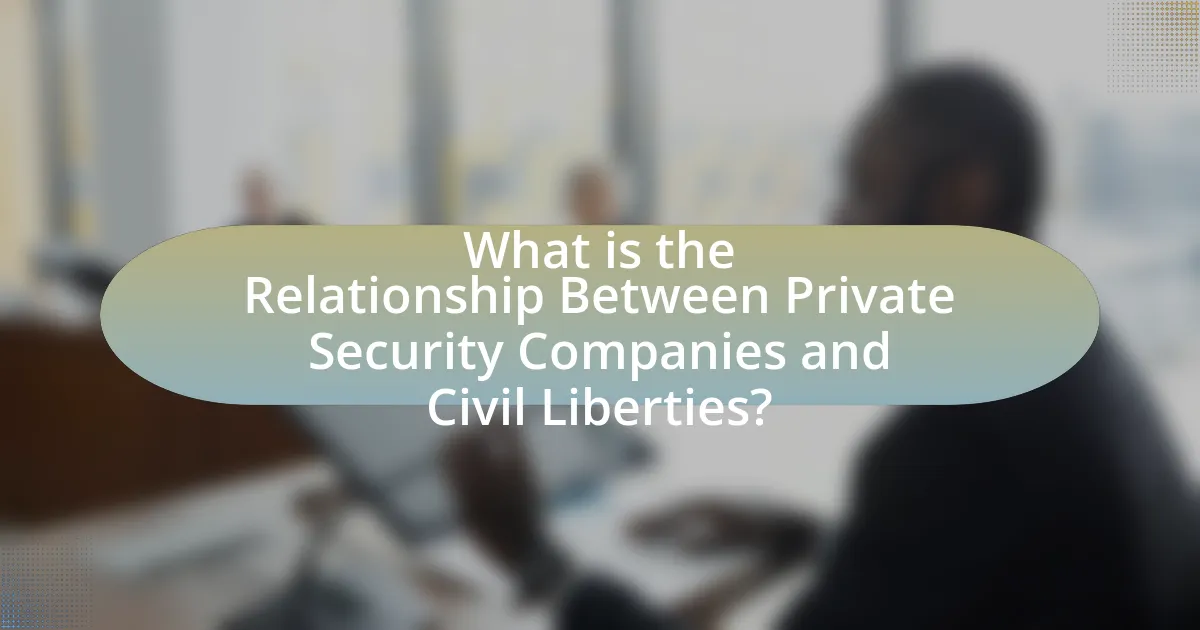
What is the Relationship Between Private Security Companies and Civil Liberties?
The relationship between private security companies and civil liberties is complex, as these entities often operate in ways that can both protect and infringe upon individual rights. Private security companies are hired to provide safety and security services, which can enhance public safety; however, their practices, such as surveillance and enforcement actions, may lead to violations of privacy and civil rights. For instance, a report by the American Civil Liberties Union highlights concerns regarding the lack of accountability and oversight in private security operations, which can result in abuses of power and discrimination. Thus, while private security companies can contribute to safety, their operations must be carefully regulated to safeguard civil liberties.
How do Private Security Companies impact individual rights?
Private security companies impact individual rights by exercising authority that can sometimes infringe upon civil liberties. These companies often operate with less oversight than public law enforcement, leading to potential abuses such as excessive force, unlawful searches, and violations of privacy. For instance, a report by the International Peace Institute highlights that private security personnel may not be held to the same legal standards as police officers, which can result in a lack of accountability for their actions. Additionally, the presence of private security in public spaces can create an environment of surveillance and intimidation, further affecting individuals’ rights to free expression and assembly.
What specific civil liberties are affected by Private Security Companies?
Private Security Companies (PSCs) specifically affect civil liberties such as the right to privacy, freedom of assembly, and due process. PSCs often conduct surveillance and monitoring activities that can infringe on individuals’ privacy rights, as seen in cases where private security personnel use technology to track individuals without consent. Additionally, the presence of PSCs at public events can lead to restrictions on freedom of assembly, as they may impose limitations on gatherings or protests. Furthermore, PSCs may operate outside the traditional legal frameworks, which can compromise due process rights, particularly when they detain individuals without the same legal protections afforded by law enforcement agencies. These impacts highlight the significant role PSCs play in shaping the landscape of civil liberties in society.
How do Private Security Companies balance security and civil liberties?
Private security companies balance security and civil liberties by implementing policies that prioritize both safety and respect for individual rights. These companies often establish clear guidelines that govern their operations, ensuring that security measures do not infringe upon personal freedoms. For instance, many private security firms adopt training programs that emphasize the importance of civil rights, which helps their personnel understand the legal boundaries of their authority. Additionally, they may utilize technology, such as surveillance systems, in a manner that complies with privacy laws, thereby minimizing the risk of overreach. Research indicates that effective oversight and accountability mechanisms, such as regular audits and community engagement, further enhance this balance by fostering transparency and trust between security providers and the public.
What are the legal frameworks governing Private Security Companies?
The legal frameworks governing Private Security Companies (PSCs) include national laws, international regulations, and industry standards that dictate their operations and accountability. National laws vary by country, often encompassing licensing requirements, operational guidelines, and oversight mechanisms to ensure compliance with local regulations. For instance, in the United States, the Private Security Industry Act of 2001 establishes licensing and training standards for security personnel. Internationally, the Montreux Document, endorsed by various states, outlines legal obligations and good practices for PSCs operating in conflict zones, emphasizing adherence to human rights and humanitarian law. Additionally, industry standards such as ISO 18788 provide a framework for establishing, implementing, operating, and improving security operations, ensuring that PSCs maintain accountability and respect for civil liberties.
What laws regulate the operations of Private Security Companies?
Private Security Companies are regulated by a combination of federal, state, and local laws, which vary significantly by jurisdiction. In the United States, the primary federal law governing private security operations is the Private Security Officer Employment Authorization Act, which mandates background checks and licensing for security personnel. Additionally, many states have their own specific regulations, such as licensing requirements, training standards, and operational guidelines, which are enforced by state regulatory agencies. For example, California’s Business and Professions Code outlines the licensing process and operational standards for private security firms. These laws aim to ensure that private security companies operate within legal frameworks that protect civil liberties while maintaining public safety.
How do these laws protect civil liberties?
Laws protect civil liberties by establishing clear guidelines that govern the actions of private security companies, ensuring they operate within the bounds of individual rights. These regulations often include provisions that limit the use of force, mandate transparency in operations, and require accountability for any violations of rights. For instance, the Private Security Industry Act 2001 in the UK mandates licensing and training for security personnel, which helps prevent abuses of power and protects citizens from unlawful detention or excessive force. By enforcing these standards, laws serve to safeguard personal freedoms and maintain public trust in security services.
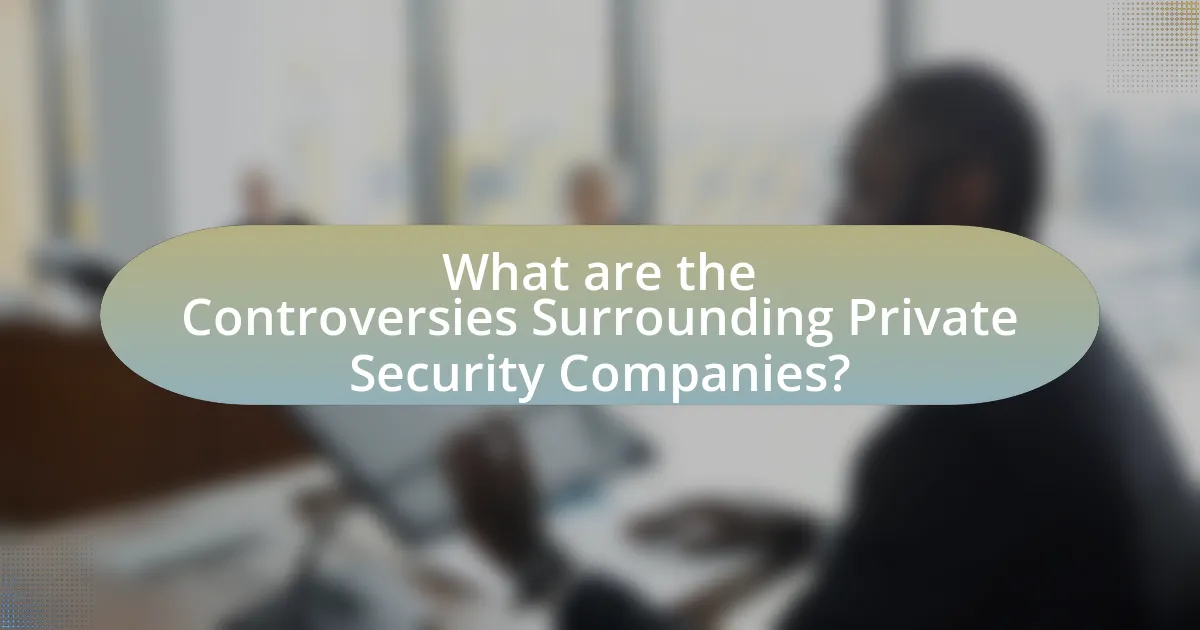
What are the Controversies Surrounding Private Security Companies?
Controversies surrounding private security companies primarily involve issues of accountability, use of force, and the potential for human rights violations. These companies often operate in conflict zones or sensitive areas without the same oversight as public law enforcement, leading to incidents where excessive force is used, as seen in cases like the Blackwater incident in Iraq in 2007, where private contractors killed 17 civilians. Additionally, the lack of regulation raises concerns about their role in surveillance and data collection, which can infringe on civil liberties. Reports indicate that private security firms may prioritize profit over ethical considerations, further complicating their impact on societal norms and legal frameworks.
Why are Private Security Companies often criticized?
Private Security Companies are often criticized for their lack of accountability and oversight, which can lead to abuses of power. These companies operate in a legal gray area, often not subject to the same regulations as public law enforcement, resulting in incidents of excessive force and violations of civil liberties. For instance, a report by the International Peace Institute highlights that private security personnel may not receive adequate training in human rights, increasing the risk of misconduct. Additionally, their involvement in sensitive areas, such as crowd control during protests, raises concerns about the potential for infringing on individuals’ rights to free assembly and expression.
What are the main ethical concerns regarding Private Security Companies?
The main ethical concerns regarding Private Security Companies (PSCs) include accountability, use of force, and the potential for human rights violations. PSCs often operate in a legal gray area, leading to challenges in holding them accountable for their actions, which can result in abuses of power. For instance, the use of force by PSC personnel can exceed what is legally permissible, raising concerns about excessive violence and lack of oversight. Additionally, PSCs may operate in conflict zones or areas with weak governance, increasing the risk of human rights violations, such as unlawful detention or torture, as documented in various reports by organizations like Amnesty International. These ethical issues highlight the need for stricter regulations and oversight to protect civil liberties.
How do allegations of abuse by Private Security Companies affect public perception?
Allegations of abuse by Private Security Companies significantly diminish public trust and confidence in these entities. When incidents of misconduct are reported, such as excessive use of force or violations of human rights, public perception shifts towards viewing these companies as unaccountable and potentially dangerous. For instance, a 2016 study by the International Peace Institute found that negative media coverage of private security firms often correlates with increased public skepticism regarding their role in maintaining safety and order. This erosion of trust can lead to calls for stricter regulations and oversight, as communities demand accountability and transparency from private security providers.
What are the implications of privatizing security services?
Privatizing security services can lead to significant implications for civil liberties, including reduced accountability and oversight. When security functions are outsourced to private companies, these entities may prioritize profit over public safety, potentially resulting in excessive use of force or discriminatory practices. For instance, a study by the American Civil Liberties Union highlights that private security personnel often operate with less regulatory oversight compared to public law enforcement, which can lead to violations of individual rights. Additionally, the lack of transparency in private security operations can hinder public trust and diminish the effectiveness of community policing efforts.
How does privatization influence accountability and oversight?
Privatization influences accountability and oversight by shifting responsibilities from public entities to private companies, which can lead to reduced transparency and diminished public accountability. When services are privatized, oversight mechanisms may weaken because private firms often operate with less regulatory scrutiny compared to government agencies. For instance, a study by the International Committee of the Red Cross in 2016 highlighted that privatized security firms frequently lack the same level of accountability as state actors, resulting in challenges in holding them responsible for human rights violations. This shift can create a gap in oversight, as private companies may prioritize profit over public interest, complicating the enforcement of standards and accountability measures.
What are the potential risks to civil liberties from privatized security?
Privatized security poses significant risks to civil liberties, primarily through the potential for abuse of power, lack of accountability, and erosion of privacy rights. Private security firms often operate with fewer regulations than public law enforcement, leading to instances of excessive force and discrimination, as evidenced by reports of aggressive tactics used by private security personnel in various settings. Furthermore, the absence of oversight mechanisms can result in violations of individuals’ rights without recourse, as these companies may not be subject to the same legal standards as public police forces. Additionally, the collection and handling of personal data by private security firms can infringe on privacy rights, as seen in cases where surveillance technologies are employed without proper consent or transparency.
What can be done to ensure the protection of civil liberties?
To ensure the protection of civil liberties, robust legal frameworks must be established and enforced that clearly define the limits of private security companies’ authority. These frameworks should include regulations that mandate transparency, accountability, and oversight of private security operations. For instance, the International Code of Conduct for Private Security Service Providers outlines principles that promote respect for human rights and the rule of law, emphasizing the need for compliance with national and international legal standards. Additionally, regular audits and independent reviews of private security practices can help identify and mitigate potential abuses, thereby safeguarding civil liberties.
What best practices should Private Security Companies adopt?
Private Security Companies should adopt best practices that prioritize transparency, accountability, and adherence to legal standards. Implementing comprehensive training programs for personnel ensures they understand legal frameworks and civil rights, which is crucial for maintaining public trust. Regular audits and assessments of security operations can identify areas for improvement and ensure compliance with regulations. Additionally, establishing clear communication channels with the communities they serve fosters collaboration and enhances public perception. Research indicates that companies that engage in community outreach and maintain open dialogue experience fewer conflicts and better relationships with the public.
How can policymakers enhance oversight of Private Security Companies?
Policymakers can enhance oversight of Private Security Companies (PSCs) by implementing comprehensive regulatory frameworks that establish clear operational standards and accountability measures. Such frameworks should include licensing requirements, regular audits, and mandatory reporting of incidents involving the use of force. For instance, the International Code of Conduct for Private Security Service Providers outlines best practices that can serve as a model for national regulations, ensuring PSCs operate within legal and ethical boundaries. Additionally, integrating community feedback mechanisms can help address public concerns and improve transparency, thereby reinforcing civil liberties while holding PSCs accountable for their actions.
What steps can individuals take to protect their civil liberties in the presence of Private Security Companies?
Individuals can protect their civil liberties in the presence of Private Security Companies by being informed about their rights and the legal limitations of these companies. Understanding local laws regarding private security operations helps individuals recognize when their rights may be infringed upon. Additionally, individuals should document any interactions with private security personnel, as this creates a record that can be used if legal action is necessary. Engaging with community organizations that advocate for civil liberties can provide support and resources for individuals facing issues with private security. Furthermore, individuals can participate in public forums or discussions to raise awareness about the implications of private security on civil liberties, thereby fostering a collective response to potential abuses.
